|
The material on this website is intended for educational use only and may not be reproduced for commercial purposes without express permission from the appropriate copyright holder.
Le contenu de ce site Web est destiné à des fins pédagogiques seulement et ne peut être reproduit à des fins commerciales à moins d'en avoir obtenu la permission du titulaire du droit d'auteur approprié.
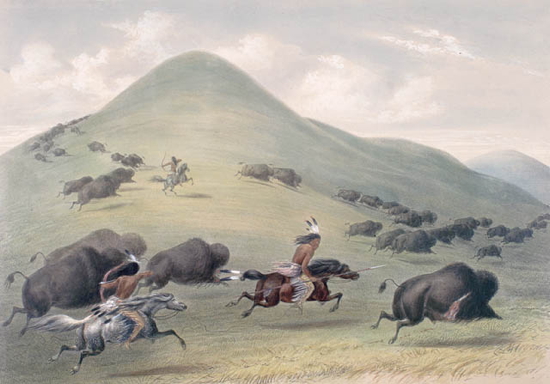
Library and Archive Canada, Acc. No. 1970-50-2.6
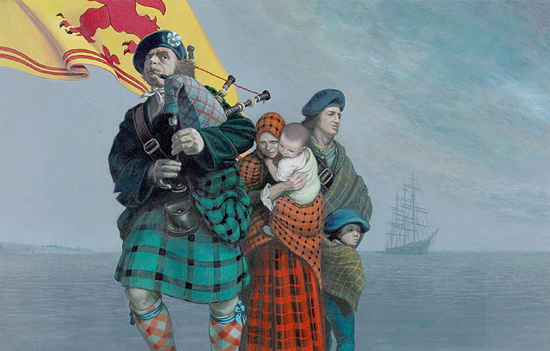
Scottish settlers and "Hector", LAC, copyright; Canada Post Corporation
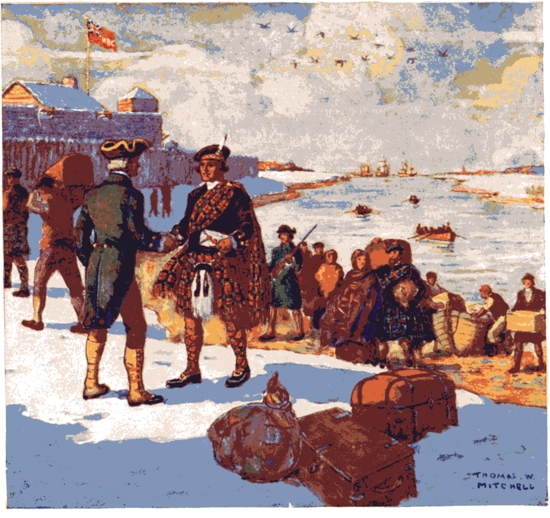
Landing of the Selkirk Settlers at York Factory, 1812. T. W. Mitchell, A Picture History of Canada, 1942
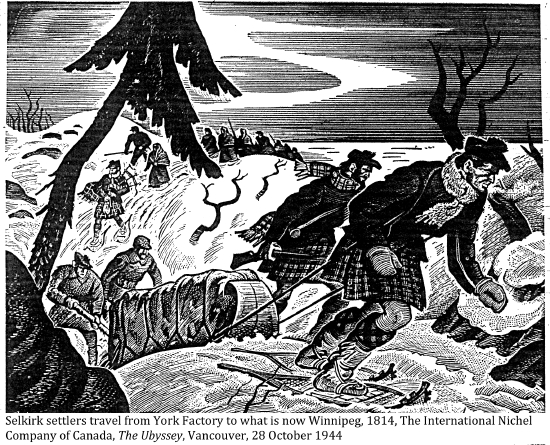
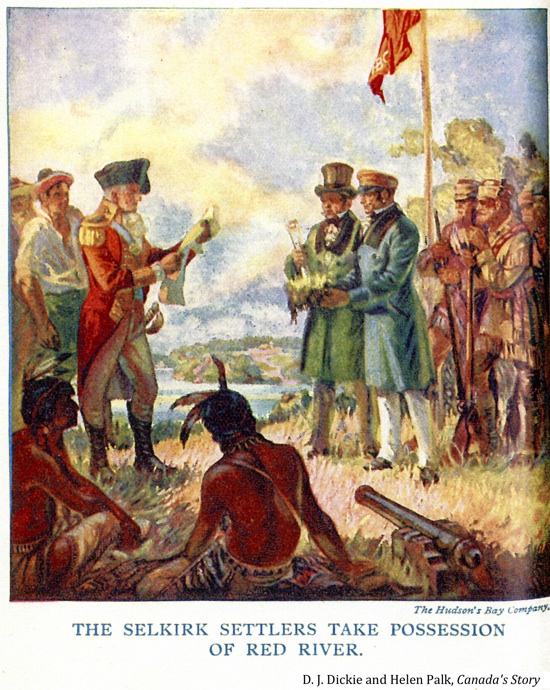
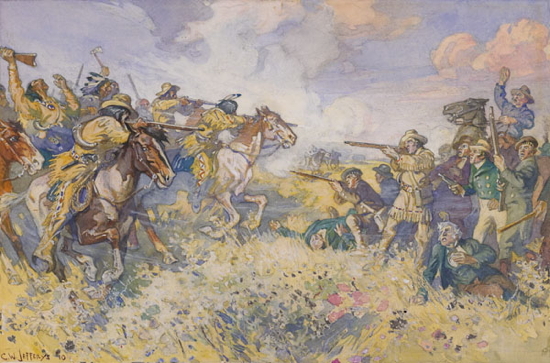
Charles Jefferys, Battle of Seven Oaks, 1816, LAC Acc. No. 1972-26-799
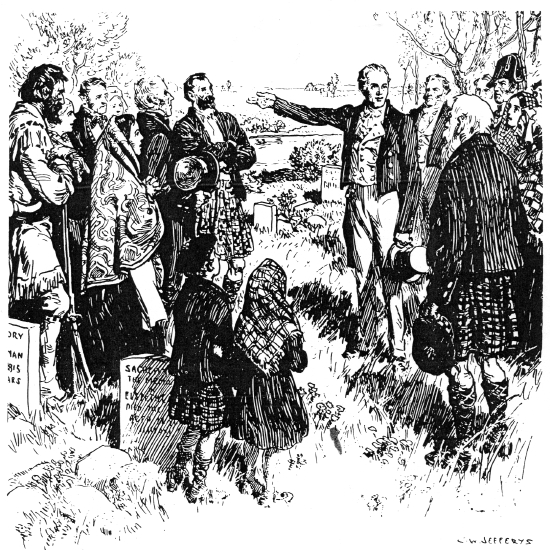
Lord Selkirk naming Kildonan, 1817. LAC, C-016750, Charles W. Jefferys, 1920s or 1930s?
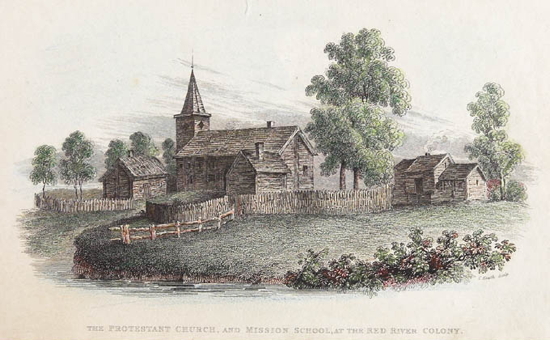
Protestant Church and Mission School, Red River Colony. LAC Acc. No. R9266-1565 Peter Winkworth Collection of Canadiana, ca. 1820-40
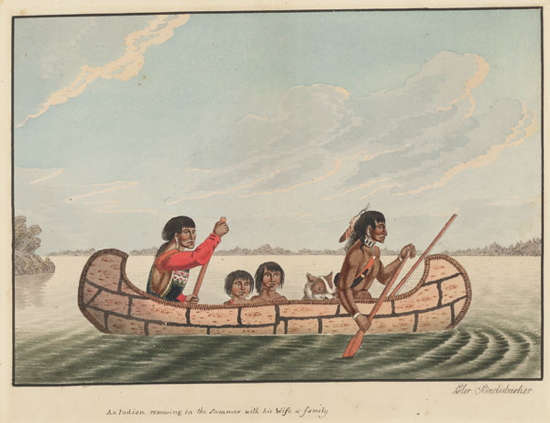
An Indian removing in the summer with his wife and family. LAC Acc. No. Acc. No. R9266-4116, Peter Rindisbacher, 1821
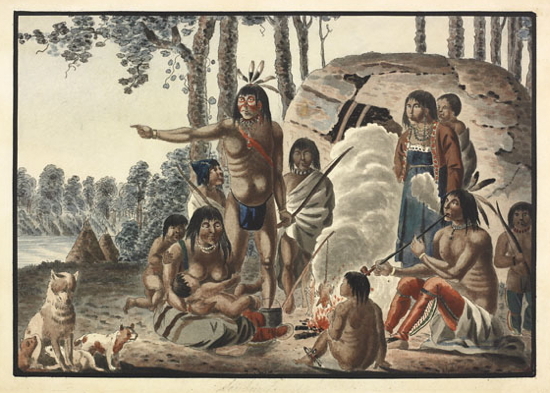
A family from the tribe of the wild Sautaux Indians on the Red River. Une famille appartenant à la tribu des Indiens Saulteux qui vivent en liberté dans la région de la rivière Rouge. LAC Acc. No. 1988-250-28, Peter Rindisbacher, 1821
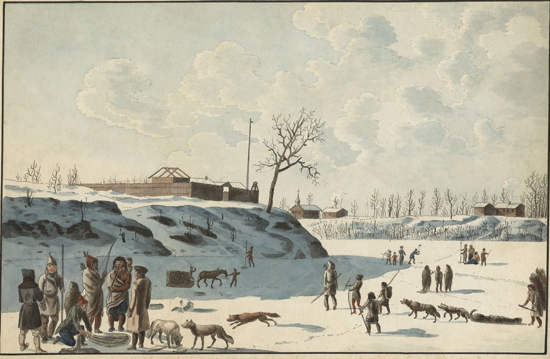
Winter fishing on ice of Assynoibain & Red River. Pêche d'hiver sur la glace des rivières Assiniboine et Rouge. LAC Acc. No. 1988-250-31, Peter Rindesbacher, 1821
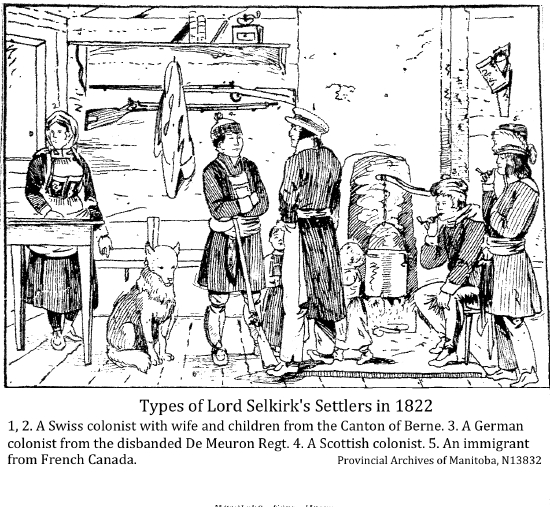
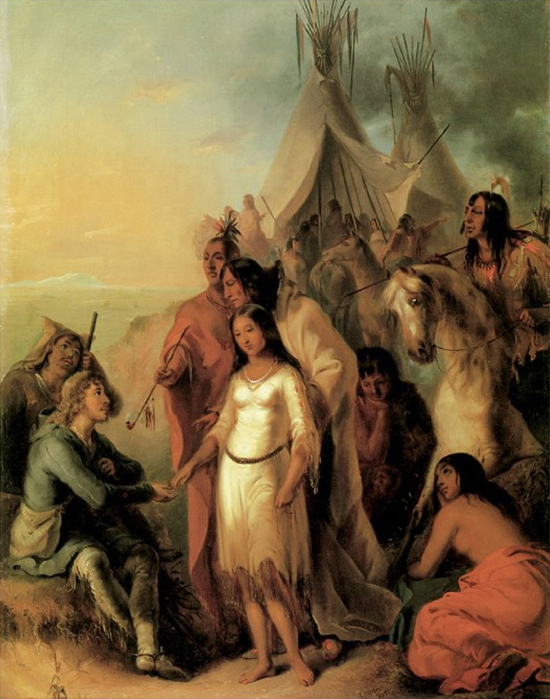
Trapper's Bride, Alfred Jacob Miller
"By marrying into the indigenous world, most of the newcomers were marrying up. They were improving their situations, politically and economically. . . The HBC built its networks – for more than 200 years one of the world's largest commercial and political structures – in good part through interracial marriages."
John Ralston Saul, A Fair Country
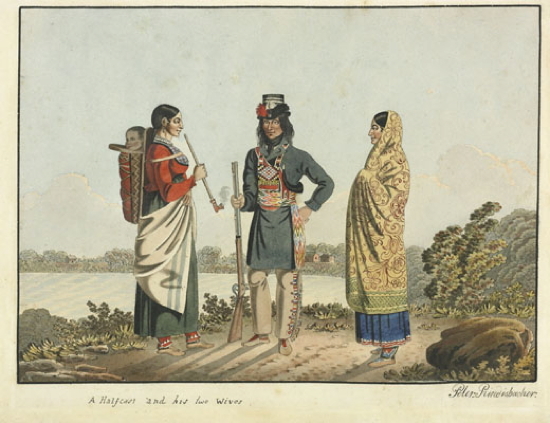
A halfcast [Métis] and his two wives. Un métis et ses deux épouses, Peter Rindisbacher, LAC Acc. No. 1973-84-1, 1825-26
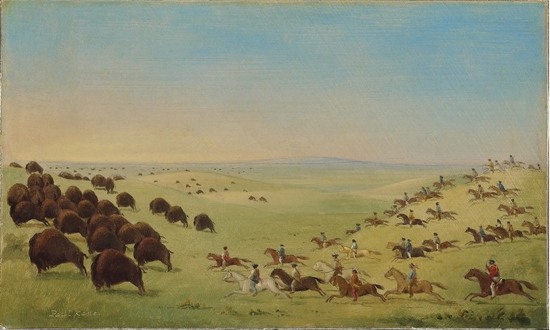
Buffalo Hunt, Paul Kane, 1846, The Thomson Collection at the Art Gallery of Ontario
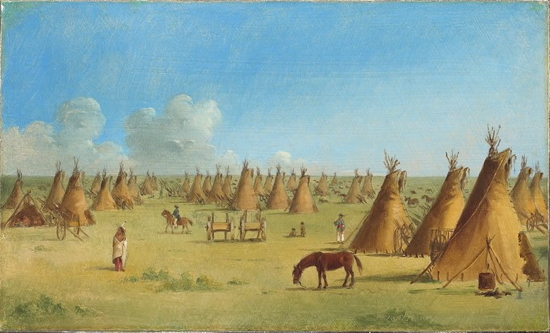
Indian Camp, Manitoba, 1862, William Hind, Toronto Reference Library JRR 3248 Cab IV(Hind) Fra
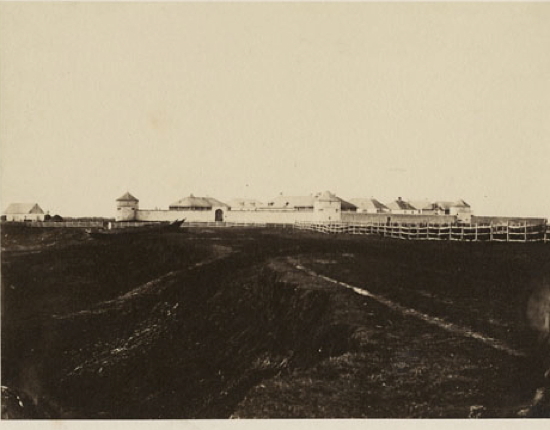
Fort and stores of the Honourable Hudson's By Company, Fort Garry at the confluence of Red River and the Assiniboine. H.L. Hime LAC C-018695, 1858
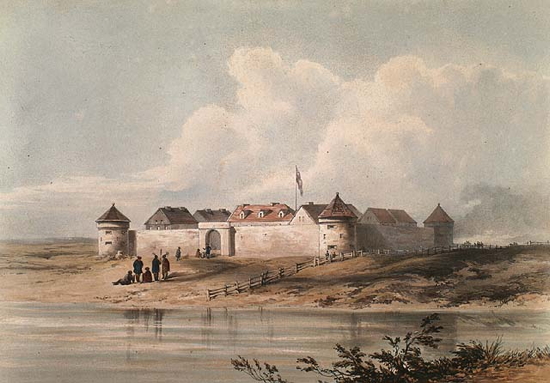
Library and Archives Canada 1969-4-35
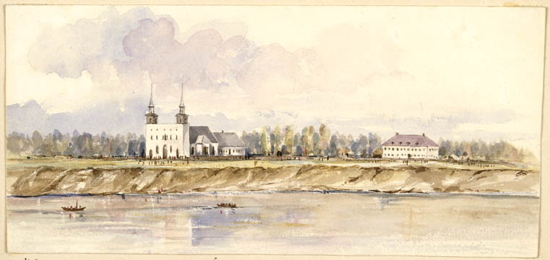
Colonie de la rivière Rouge, à Saint-Boniface. St. Boniface, Red River Settlement. LAC Acc. No. 1950-63-7, William Henry Edward Napier, 1858
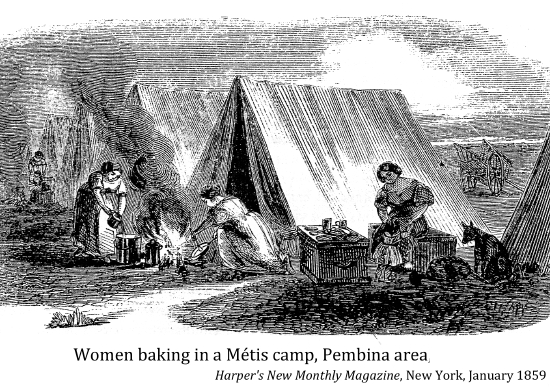

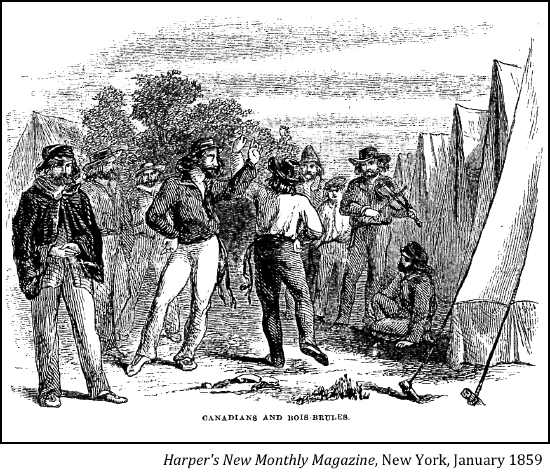


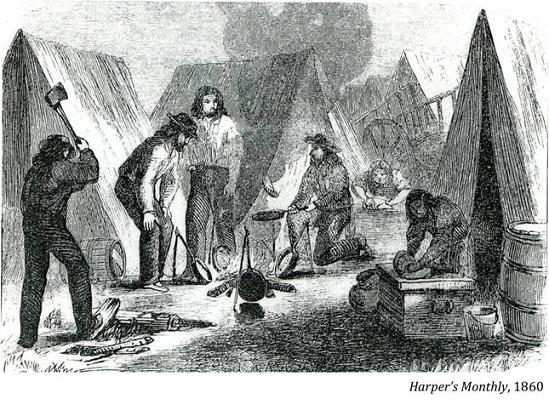
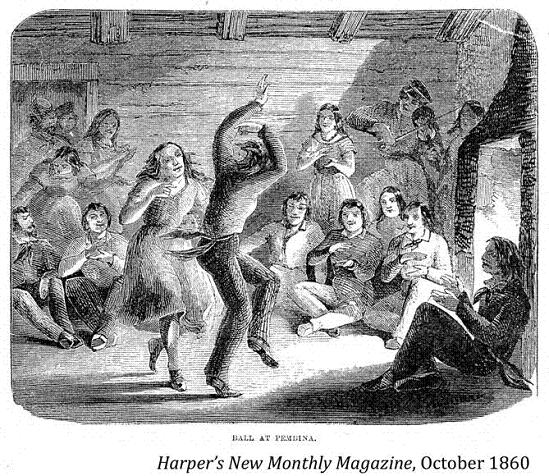

"Manitobah" Manitoba's settlers house and Red River cart, 1862,
LAC Acc. No. 1937-283-1
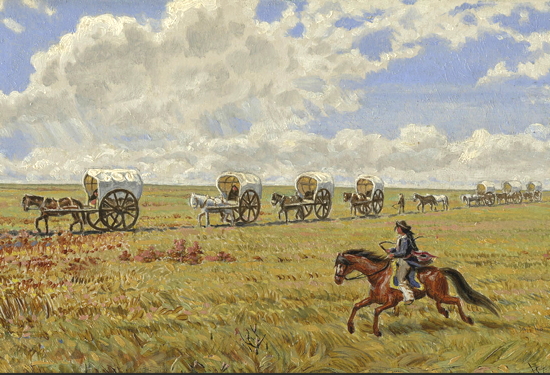
Red River Cart Train, William G. R. Hind, 1862, Toronto Reference Library JRR 3253 Cab IV(Hind) Fra
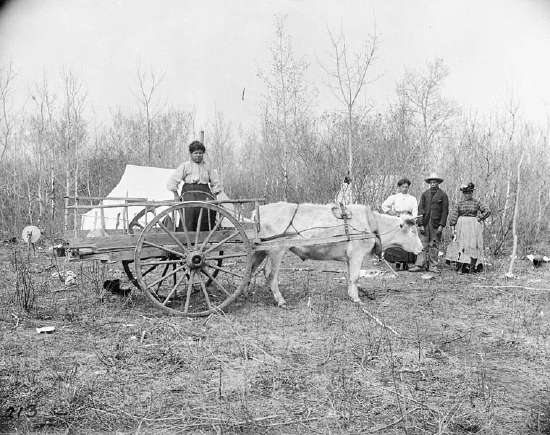
A Métis family at their camp with a Red River Cart in Manitoba. Une famille métisse à leur campement avec une charrette de la rivière Rouge au Manitoba. LAC c001644, 1890
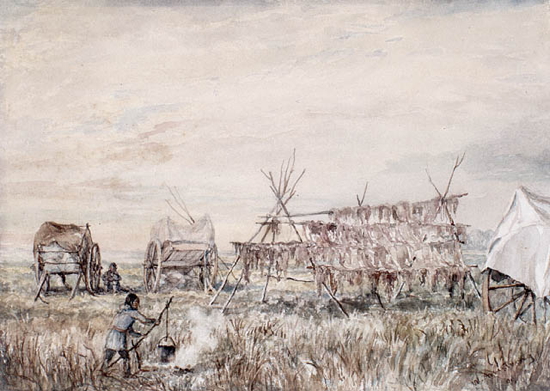
Buffalo Meat Drying, White Horse Plains, Red River. Séchage de la viande de bison, plaines White Horse, rivière Rouge. LAC Acc. No. 1989-492-2, William Armstrong, 1899
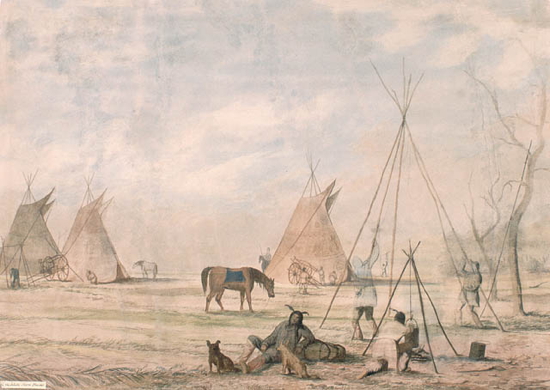
On the White Horse Plains near Old Fort Garry, 1862,
Library and Archives Canada Acc. No. 1981-55-1
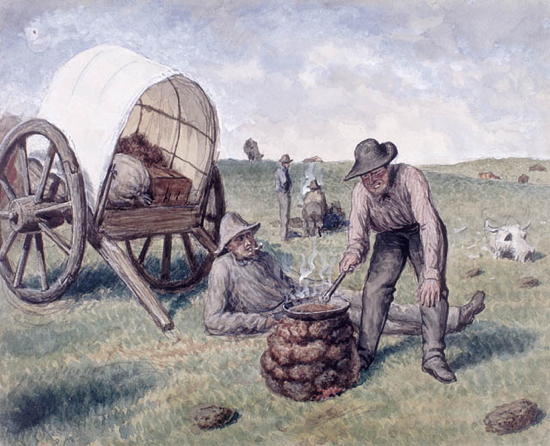
Camping on the Prairie. Campement dans les Prairies. LAC Acc. No. 1937-291-1, William G. R. Hind, ca.1863
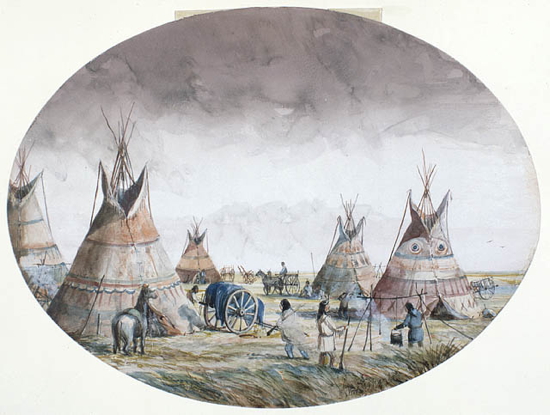
Prairie Indian Encampment at Red River. Campement d'Indiens des Prairies à la rivière Rouge. LAC Acc. No. 1989-487-1, William Armstrong, 1868
"We never sold these lands [Indigenous land] to you [Hudson's Bay Company] and yet you sell these lands to the Strangers [Canadians] for much money . . . How is it that you want to sell what is not yours."
Mahkesis, 1868
In 1869 the HBC sold Rupert's Land to Canada for £300,000, 45,000 acres of land around its 120 trading posts and the right to claim one-twentieth of the cultivatable prairie land. [the largest real-estate deal in history]
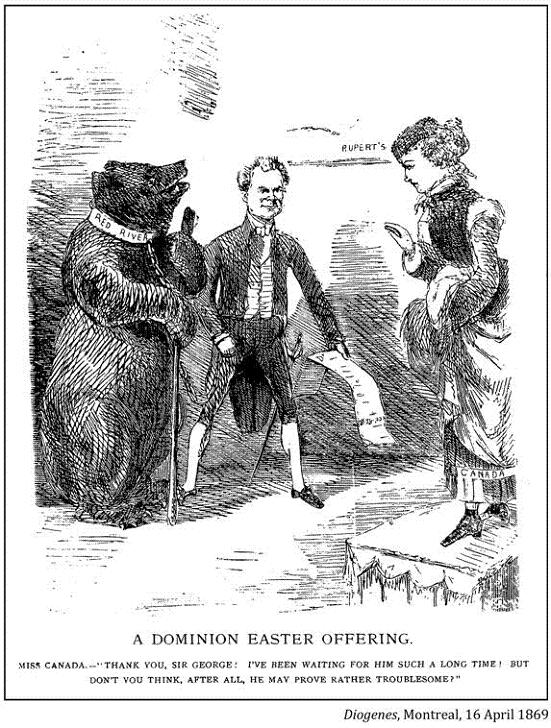
Sir George E Cartier had been a member of the Commission sent to England to negotiate for the transfer of the North-West Territory to the Dominion and the surrender of the rights of the Hudson Bay Company. The successful result of the mission was now announced to Parliament. The conditions agreed upon involved a payment by the Dominion Government of £300,000.
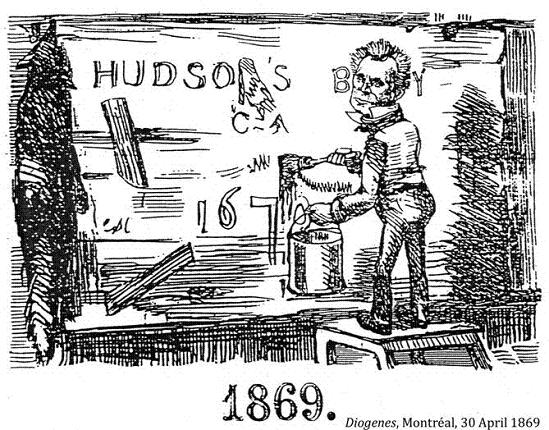
"[When Canada negotiated with the Hudson's Bay Company directorship in London to acquire Rupert's Land] no representative from Rupert's Land, including Indian and Metis peoples were invited to participate, let alone even consulted."
Bill Waiser
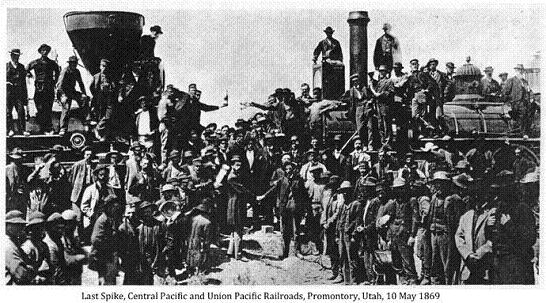
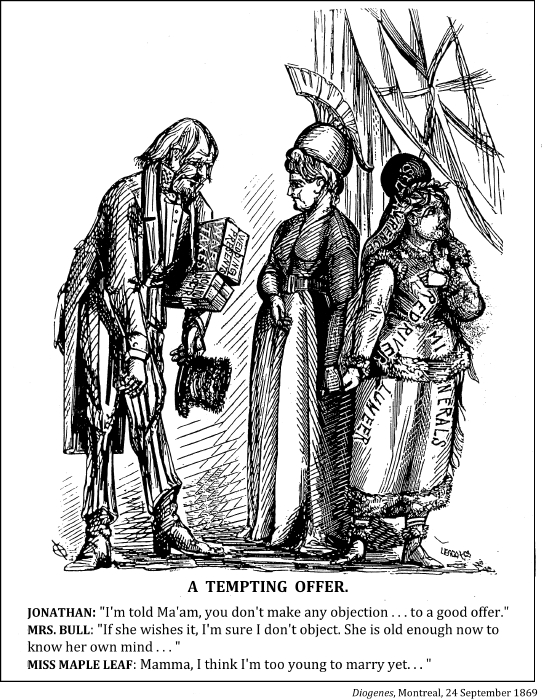
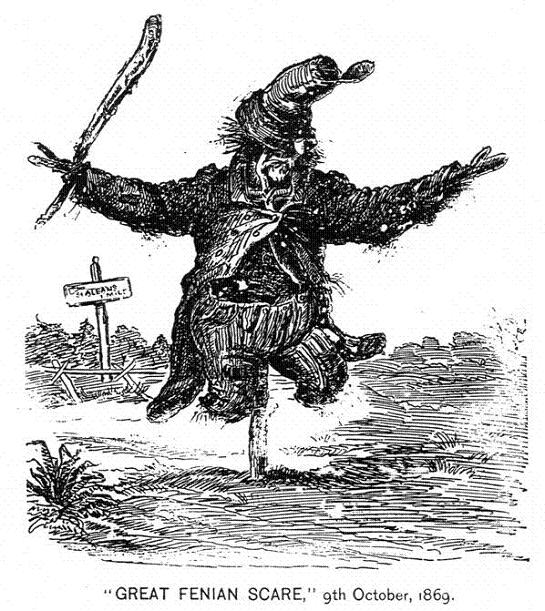
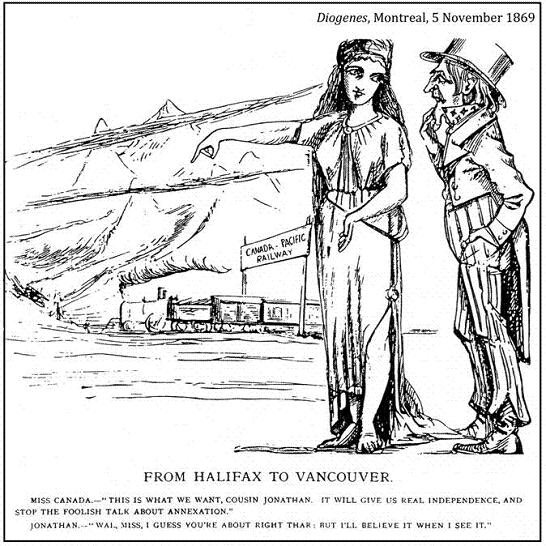
"I have always feared the entrance of the North-West into Confederation, because I have always believed that the French-Canadian element would be sacrificed."
Bishop Tache to Cartier, 7 Oct. 1869
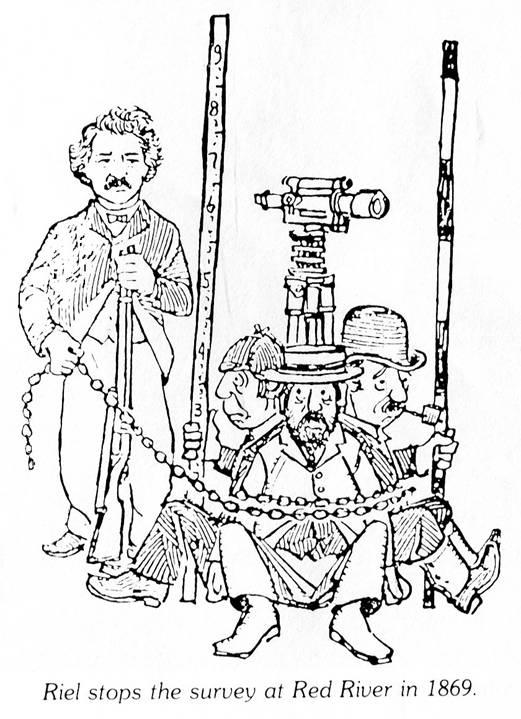
"You go no farther!"
Louis Riel. standing on British surveyor's chain, 11 October 1869
"The arrival of the Canadian agents in the country was remarkable by the disdain which they affected for the authority of the company and for the original settlers. They attempted to seize the best properties of the Metis particularly at Oak Point . . . They pretended that they had bought these properties from the Indians . . .
Canada committed another intrusion in the summer of 1869 by surveying the public and private lands around Fort Garry with a new system of measurement, thus disturbing, without any explanation, the established order and unscrupulously upsetting the original settlers in the peaceful and legal possession of their land . . ."
Louis Riel
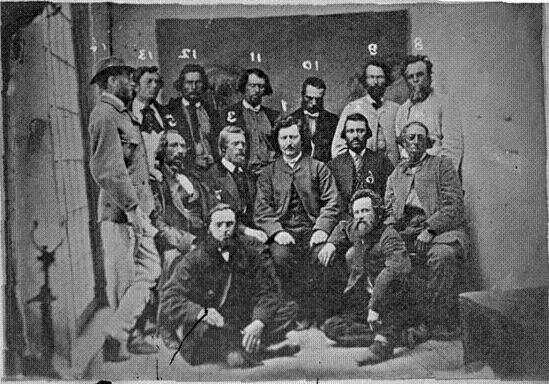
1869 Louis Riel and his Council, Library and Archives Canada
"It is altogether too much of a joke to think of a handful of people barring the way to the onward progress of British institutions and British people on the pretense that the wide continent is theirs."
The Globe, Toronto, 17 November 1869
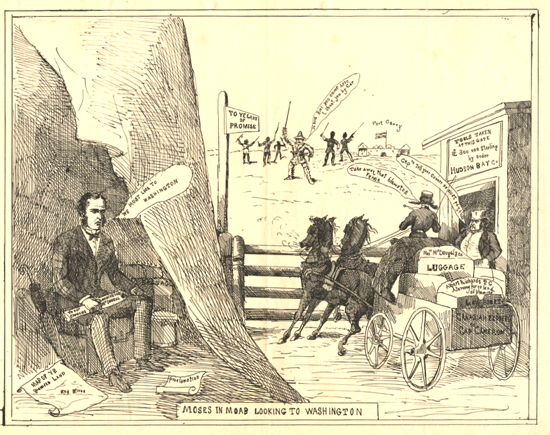
LAC, Acc. No. R10770-11869-1870 Moses in Moab looking to Washington. McDougal and Cameron attempting to cross a fence and enter Canada, with Riel in the background near Fort Garry waving a sword and threatening them.
"The French half-breeds at Red River are pertinaciously resolved to keep the North West a buffalo reserve forever."
Sir John A. Macdonald, 1869
"The métis were not slaves, to be bought and sold with this land! They were free men, they always had been. They must fight back now and establish their rights while they had the chance. As the English had done in England, as the Canadians had done, too, they must secure their freedom from arbitrary authority before it was too late."
E. B. Osler, 1961
"For the first time, [when Louis Riel stopped the survey of his cousin's land] men from Ontario had been forced to acknowledge that the métis had a claim to this land; and these métis had been shown that they should not bow to the land-grabbing immigrants from the East."
E. B. Osler, 1961
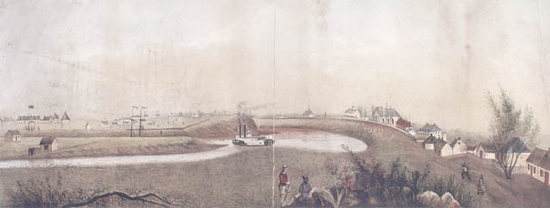
Panoramic view on Fort Garry, Winnepeg, and St. Boniface Manitoba ca. 1870,
Library and Archives Canada C-002823
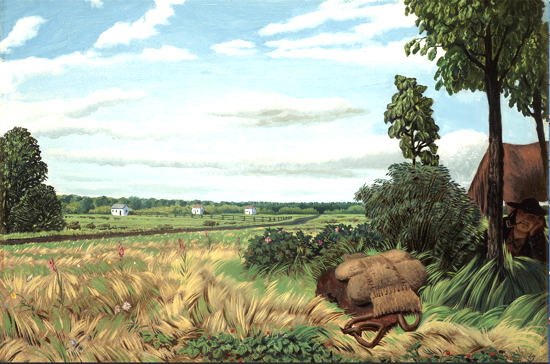
Roadside Scene with Three Houses and Figure (Manitoba?), William G. R. Hind, 1870, Toronto Reference Library 941-3-37 Cab IV(Hind) Fra
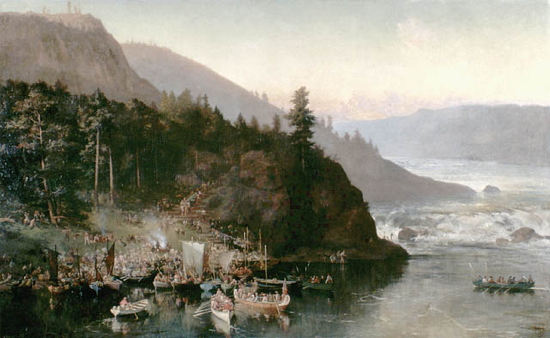
The Red River Expedition at Kakabeka Falls. Expédition à la rivière Rouge aux Chutes Kakabeka. Francis Ann Hopkins, LAC Acc. No. 1989-400-1, 1877.
[The Red River (or Wolseley) Expedition was a military force under the leadership of Colonel Garnet Wolseley. It was authorized to confront the Métis in 1870, during the Red River Rebellion (Red River Resistance). The expedition was also intended to counter potential American expansionist actions. Following an arduous journey, the expedition arrived at Upper Fort Garry, ended Louis Riel's Provisional Government and eliminated the threat of American expansionism.]
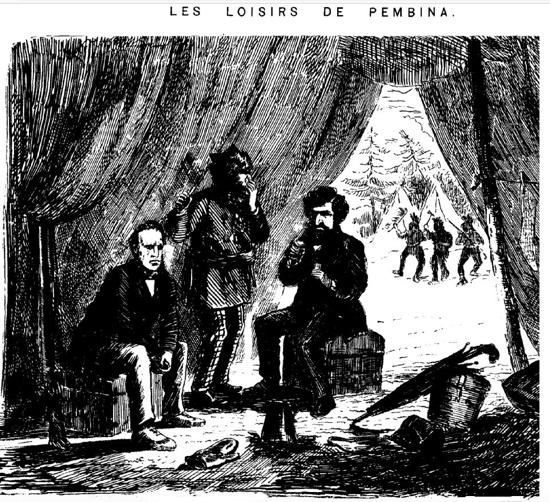
[William McDougall, the Lieutenant-Governor of the newly acquired territory, was prevented from entering the Red River settlement by the Métis.}
L'opinion publique journal illustré, Montreal, 1 January 1870
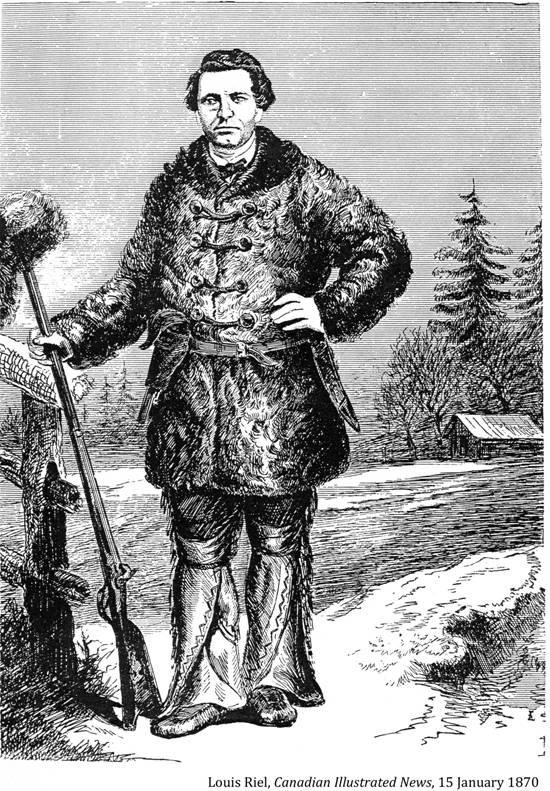
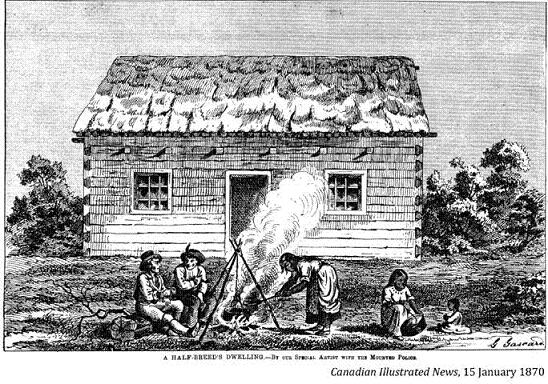
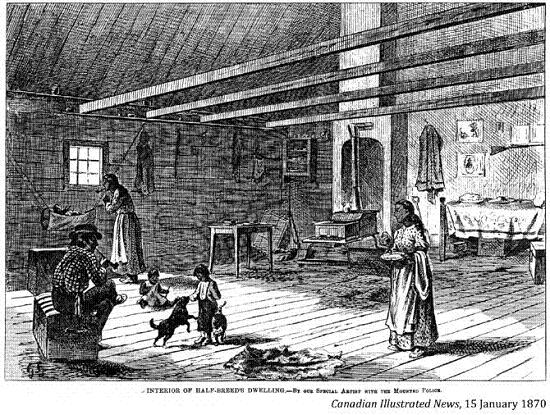
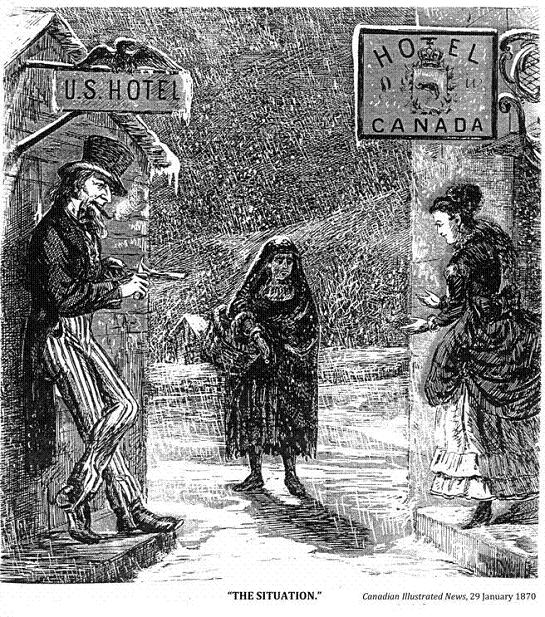
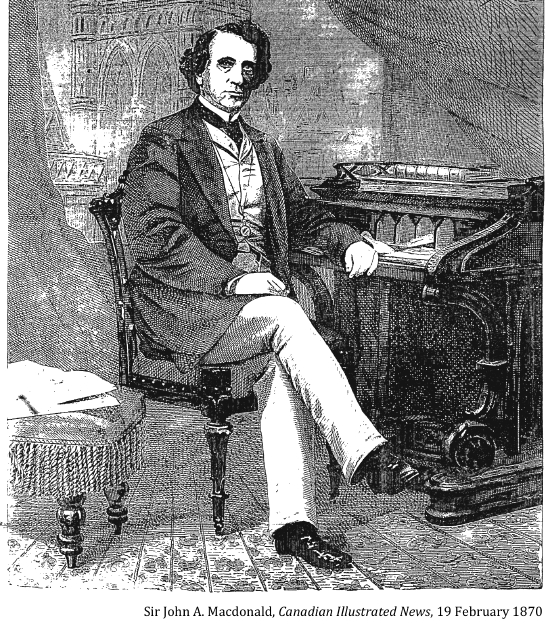
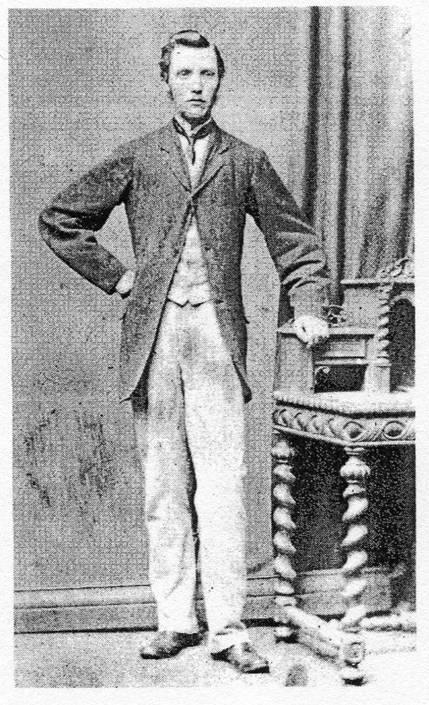
Thomas Scott
"The métis are a pack of cowards. They will not dare to shoot me."
Thomas Scott, 4 March 1870
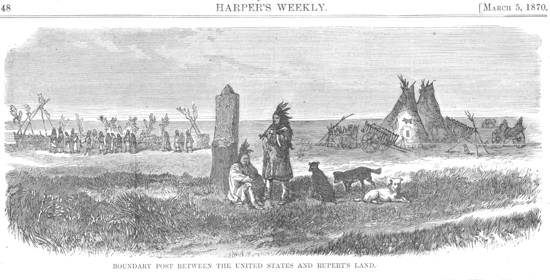
Harper's Weekly, New York, 5 March 1870
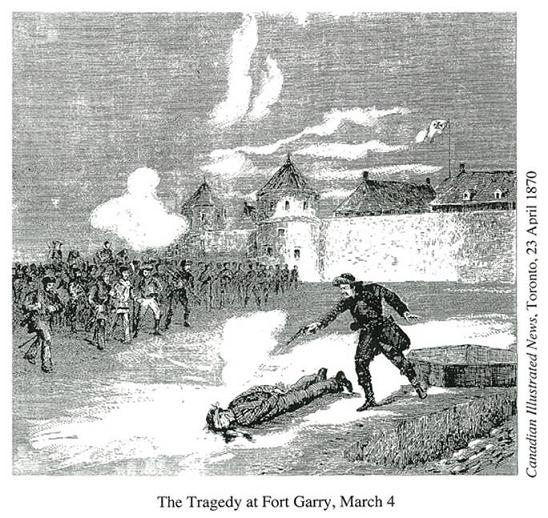
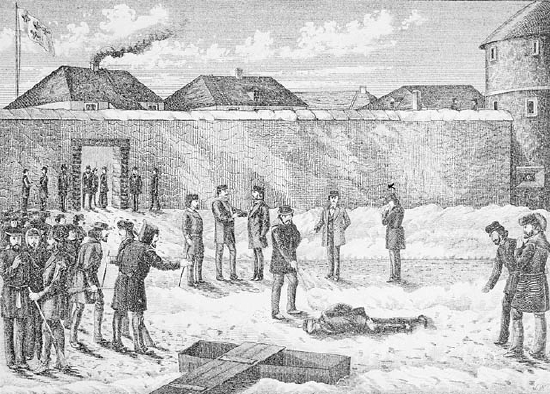
The execution of Thomas Scott, LAC, C-118610, 1870
"The execution of Thomas Scott ruined Riel's name forever in Eastern Canada."
Edward McCourt, Revolt in the West, 1958
"[The execution of Thomas Scott] was Riel's one great political blunder."
Lewis H. Thomas
"I swear . . . before God, shooting Thomas Scott was not a crime. It was a political necessity. I commanded the shooting, believing it necessary to save the lives of thousands."
Louis Riel
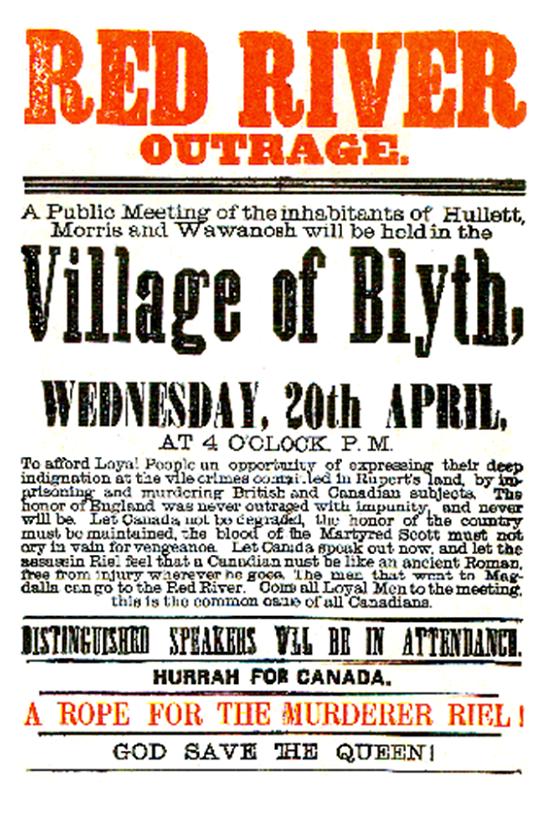
Manitoba Act, 12 May 1870
Whereas it is probable that Her Majesty The Queen may, pursuant to the Constitution Act, 1867, be pleased to admit Rupert's Land and the North-Western Territory into the Union or Dominion of Canada, before the next Session of the Parliament of Canada: . . .
Therefore Her Majesty, by and with the advice and consent of the Senate and House of Commons of Canada, enacts as follows:
31. And whereas, it is expedient, towards the extinguishment of the Indian Title to the lands in the Province, to appropriate a portion of such ungranted lands, to the extent of one million four hundred thousand acres thereof, for the benefit of the families of the half-breed residents, it is hereby enacted, that, under regulations to be from time to time made by the Governor General in Council, the Lieutenant-Governor shall select such lots or tracts in such parts of the Province as he may deem expedient, to the extent aforesaid, and divide the same among the children of the half-breed heads of families residing in the Province at the time of the said transfer to Canada, and the same shall be granted to the said children respectively, in such mode and on such conditions as to settlement and otherwise, as the Governor General in Council may from time to time determine.
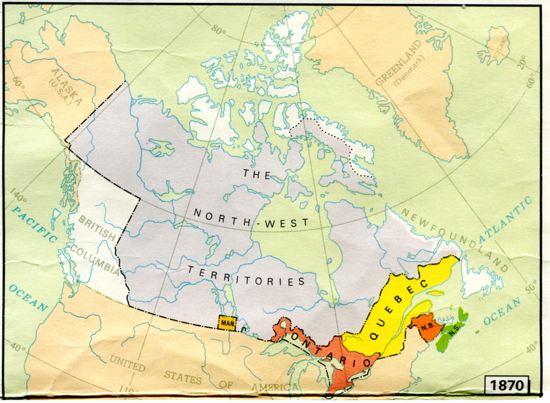
Surveys and Mapping Branch, Ottawa, 1969
%201913.jpg)
Red River Expedition, William Armstrong, Toronto Reference Library JRR 2431 Cab IV (Armstrong) 1913, July 1870
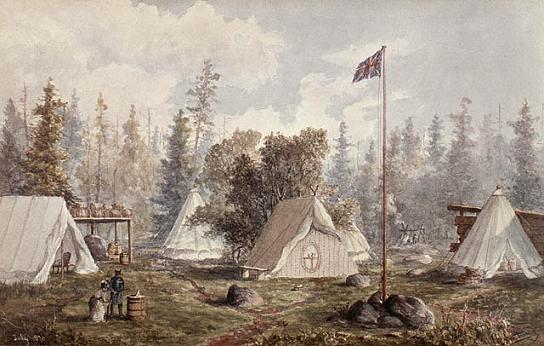
Colonel Garnet Wolseley led an expedition from Canada to Fort Garry in 1870
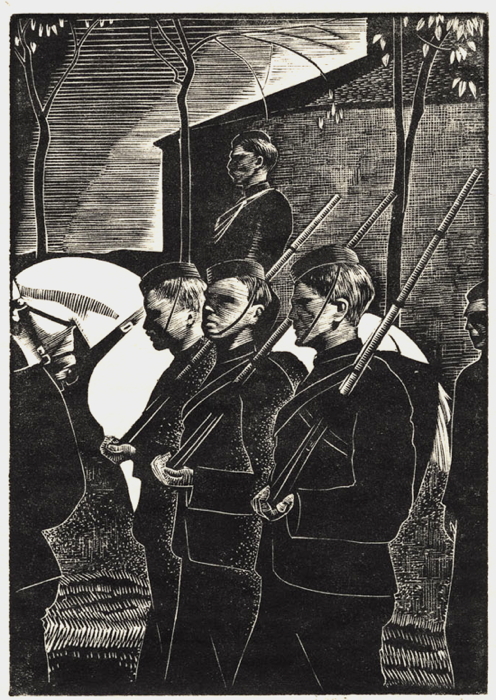
Wolseley's Troops enter the Fort, 1870. LAC, Acc. No. 1934-39, ca. 1938
"We may be a small community, and a half-breed community at that – but we are men, free and spirited men, and we will not allow even the Dominion of Canada to trample on our rights."
New Nation, 14 January 1870
"He [McDougall] looked at the problems confronting him from a regional point of view. As far as he was concerned, what was good for the people of Ontario was good for all of Canada – including the natives of Red River whom he was about to rule."
E. B. Osler, 1961
"These impulsive half-breeds . . . must be kept down by a strong hand until they are swamped by the influx of settlers."
Sir John A. Macdonald, letter, 23 Feb. 1870
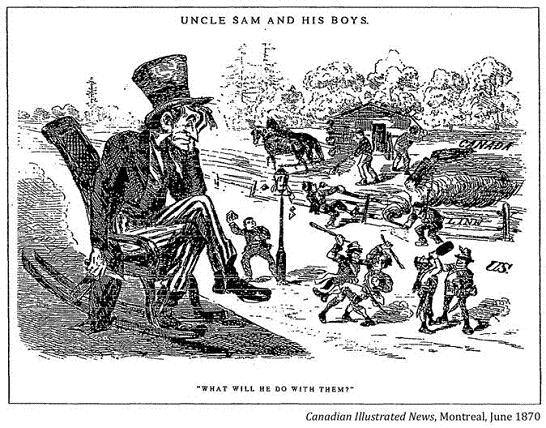
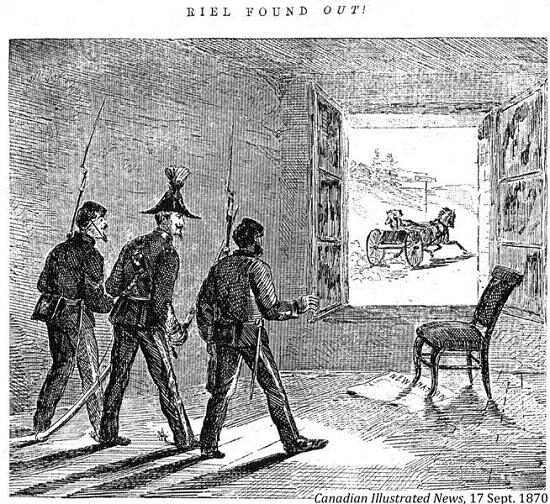
"Most of us felt that we had to settle accounts quickly with Riel, who had murdered the Englishman, Mr. Scott. Had we caught him, he would have had no mercy."
Colonel Garnet Wolseley
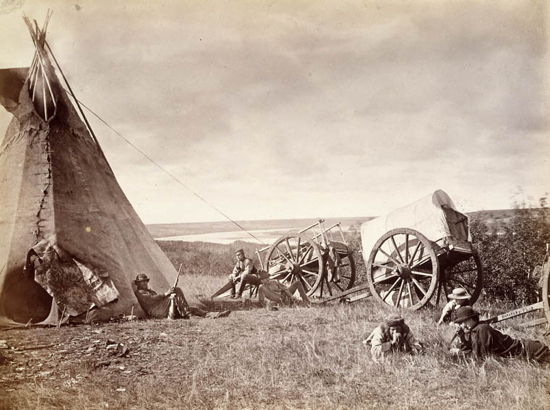
At Elbow of North Saskatchewen River, Library and Archives Canada, PA 138573
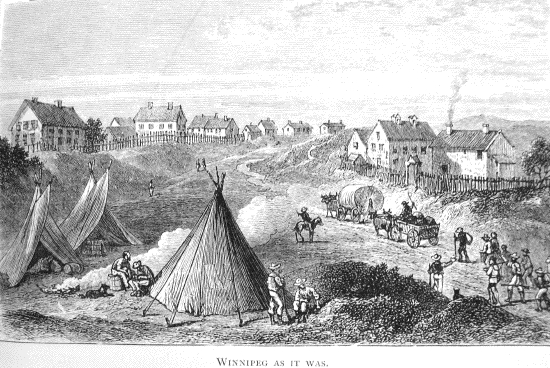
Canadian Pictures Marquis of Lorne, 1885
"It [the rising led by Louis Riel in 1869] was the inevitable reaction of a small group, conscious of its own identity, against the threat of absorption by a larger group, of a weak culture against a strong and aggressive one, of a simple economy against a highly competitive one."
George F. G. Stanley
"The march of civilization in the North-West then began (1869-70], and today, instead of being a vast hunting ground and wilderness, it is the home of thousands of thrifty settlers, and with the great transcontinental railway, from ocean to ocean, placed Canada in the proud position of being one of the brightest jewels of the British crown."
Alexander Begg
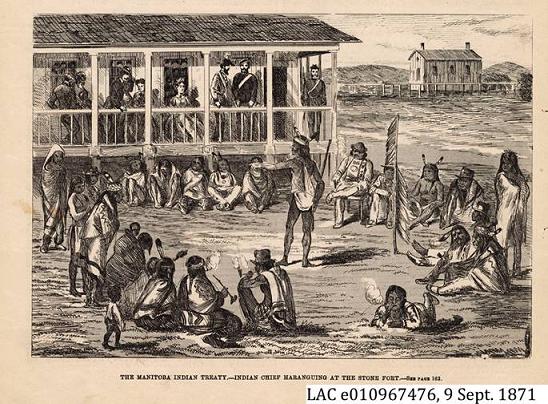
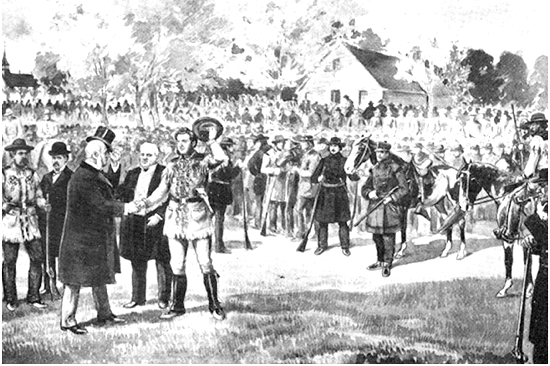
Louis Riel and A. G. Archibald, University of Manitoba [Adams George Archibald was the lieutenant-governor of Manitoba. Fearing a Fenian invasion from the U.S. he publically thanked Riel for organizing the Métis to repel the threat.]
"Métis leaders were exiled and nine men who had participated in good faith in the negotiations of Manitoba into Confederation were murdered by the troops. . . Manitoba did not just “enter” Canada, it was burned, assaulted and beaten into Confederation. The parts of the Manitoba Act, 1870 that specifically protected Métis lands, the French language and the Catholic schools were dismissed by the new regime in Manitoba. It took the better part of 150 years and three trips to the Supreme Court of Canada to force Manitoba to honour those constitutional commitments."
Jean Teillet, Louis Riel and Canada: A New Relationship, 150 Years in the Making
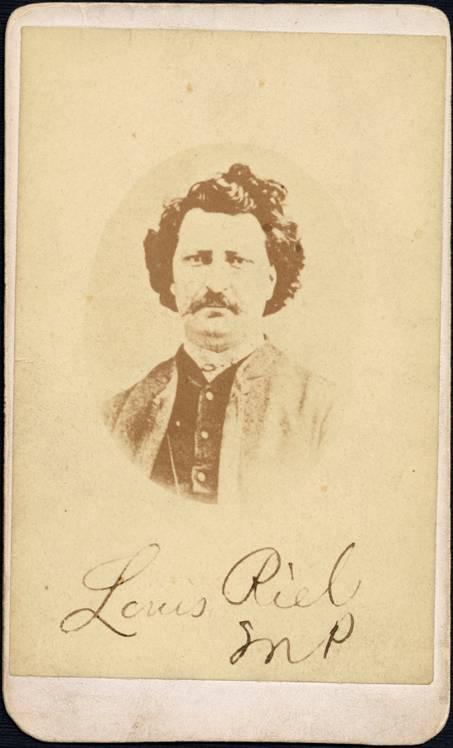
Studio portrait taken in Ottawa after Riel was elected the Member of Parliament for Provencher, Manitoba, 1873, Notman Studio, Library and Archives Canada, Acc. no. 1957-049, C-002048
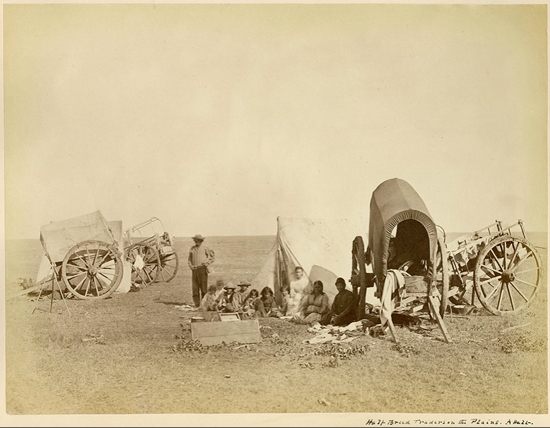
Me´tis Traders on the Plains. Marchands de fourrures me´tis sur les Plaines, 1872-73, LAC e011156506_s1/
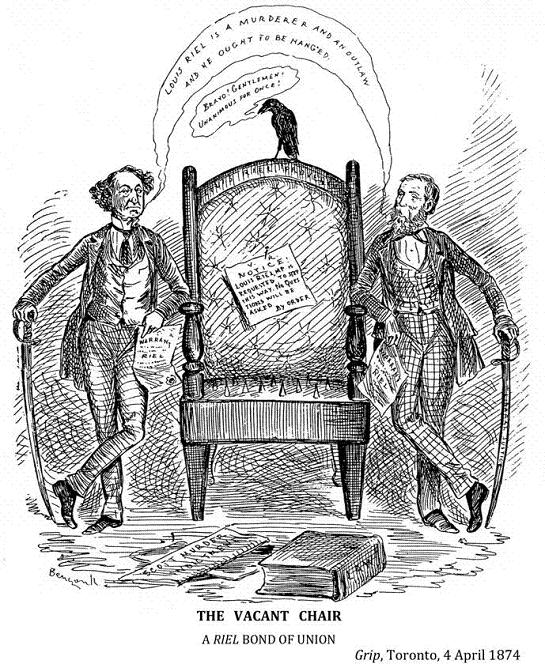
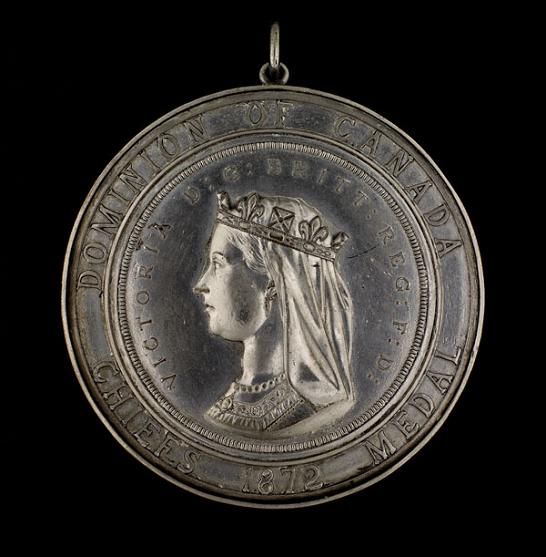
Treaty medal, 1872
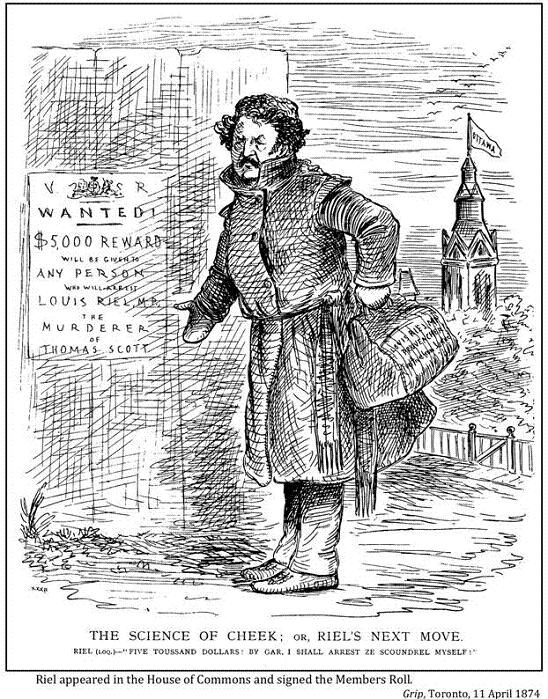
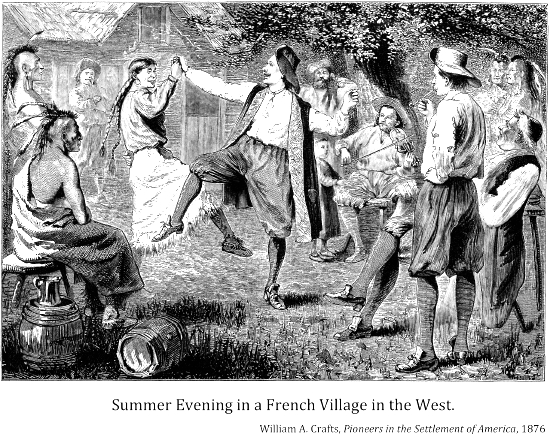
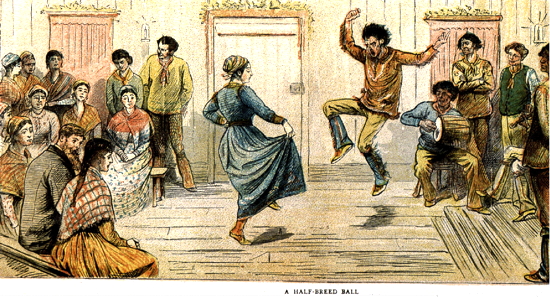
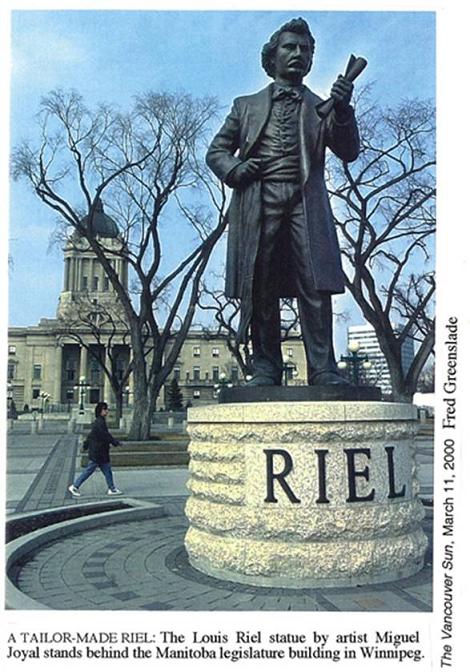
"I struggled not only for myself, but I struggled for the rights, for the inauguration of the principles of responsible and constitutional government in Manitoba."
Louis Riel, 1885
"I know that through the grace of God I am the founder of Manitoba."
Louis Riel, speech, 31 July 1885
"There was concluded [the Manitoba Act of 1870] the Canadian government's first essay on territorial administration. The initial venture in applying measures conceived in Ottawa without reference to the experience and convictions of the North-West population had ended in dramatic defeat. The lesson, however, was never completely take to heart."
Lewis Herbert Thomas
|

























































%201913.jpg)















